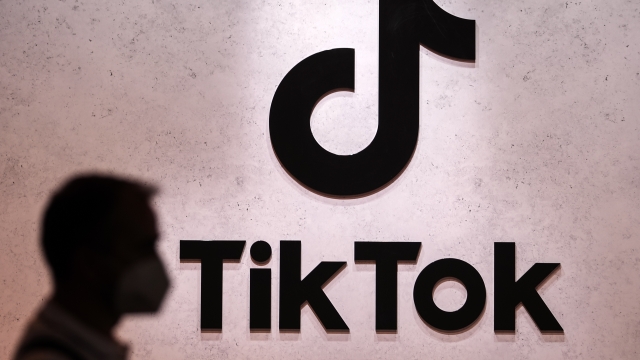A TikTok video portraying a father and daughter, luxury cars and glamorous homes doesn’t seem out of the norm for the social media platform. But when that father is a former defense minister of Ukraine, and an AI voice-over falsely claims he misused Western funds to fund a lavish lifestyle, the TikTok is a “breadcrumb” to a massive Russian disinformation investigation, experts say.
“What started as a following some breadcrumbs on a handful of TikTok accounts, ended up becoming this massive investigation into what must have been a very sizable information operation,” Andy Carvin, senior fellow and managing editor of the Atlantic Council Digital Forensic Research Lab, told Scripps News.
Ultimately, the false TikTok video was disseminated across thousands of fake TikTok accounts, according to a new report by the Digital Forensic Research Lab (DFRL) on Russia’s disinformation campaigns. In many cases, it was the only post on these accounts. It included old photos of former Ukraine defense minister Oleksii Reznikov and his daughter, Anastasiia Shteingauz. The fake video also used images traced back to real estate listings of, at the time, unpurchased property, according to the DFRL.
“It's one thing to see a bunch of people talking about a politician and accusing them of corruption. Partisan conversations happen all the time online. But once you start seeing a similar narrative popping up again and again,” Carvin said, “well, our Spidey sense goes off when those things happen.”
That suspicion led to what Carvin called a “network” of TikTok accounts attempting to send a clear message.
“The whole lot of them, when combined, clearly had a shared message of trying to convince the public that the Ukrainian government is corrupt, and they can't be trusted,” Carvin told Scripps News.
That “lot” amounted to nearly 13,000 TikTok accounts, which had a combined total of over 800,000 followers. The videos gained hundreds of thousands of views.
A TikTok spokesperson told Scripps News the company was aware of these fake accounts before the DFRL investigation and removed them from the platform.
“It was the largest information operation that they had ever seen on the platform. And their investigation concluded it was coming from Russia,” Carvin said.
With over a billion users, 13,000 accounts on TikTok are a drop in the bucket. But in the realm of disinformation, this network is valuable.
"The fact that Russia has determined that the network is valuable enough as a mass medium platform that they invested all of this time, quite probably a lot of money as well to create these accounts.”
TikTok isn’t the only battlefield in Russia’s disinformation war, Carvin said. Facebook, X (formerly Twitter), YouTube and Telegram are all parts of Russia’s ever-expanding information war which seeks to discourage support for Ukraine — especially from Western countries like the United States.
SEE MORE: Russian intelligence controls warlord's disinformation empire with AI
“Battles are no longer purely won on physical battlefields. There are cultural and informational battlefields taking place, constantly. And they're taking place everywhere, even in places where there's no war going on,” Carvin said.
This information attack on Ukraine isn’t new, according to the DFRL’s report. What’s different is that these campaigns are no longer just targeting Ukrainian President Volodymyr Zelensky but also government officials, military figures, and local authorities.
And the battle strategies have evolved.
Russia’s disinformation campaign has gone a step further since the war in Ukraine: cloning legitimate and trusted news websites.
“You just copy and paste the website, from the original version, make some adjustments to it, and drop in whatever messaging you want, that you're trying to convince the public,” Carvin said.
In what is commonly referred to as Operation Doppelganger or the Doppelganger Campaign, which began in 2022, bad actors use this technique “to just add that extra layer of credibility to their messages,” Carvin said.
"All it takes is people to start sharing a link without thinking very hard,” he added.
Another technique combines these strategies, using fake social media videos and impersonating news websites. Through videos shared on X pretending to be from the BBC, pro-Russian social media sources amplified false allegations that Ukraine re-sold weapons to drug cartels and terrorist groups like Hamas. The BBC denied any involvement with the falsified video.
“Russia has a fascinating strategy when it comes to posting propaganda disinformation and the like,” Carvin said. “They don't embrace quality. Their goal isn't to make the perfect deep fake or the perfect lie. They would rather throw as much spaghetti as possible at the wall and see what sticks.”
“Because part of the role of these campaigns is to confuse the public to the point where they truly believe nothing anymore,” he added.
Russia's information war against Ukraine remained in full swing this week after Russian President Vladimir Putin recently claimed without proof Ukraine was involved in the terror attack outside Moscow last week.
Carvin said Russia is in the anti-Ukraine disinformation war “for a long haul.” That long game is currently playing out in the US where there is growing partisan dividing line over continuing aid to Ukraine.
“From Russia's perspective, all they have to do is wear down enough of the public and enough policymakers around the world that things shift away from some countries and individuals supporting Ukraine.”
Trending stories at Scrippsnews.com



